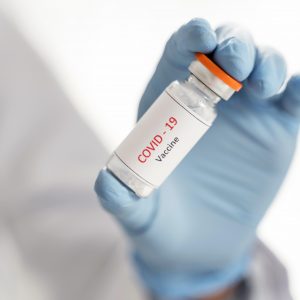Comparing Best COVID-19 Vaccines
For millions of people worldwide, 2020 and the beginning of 2021 have been quite challenging. With COVID-19 taking over, many people lost their jobs, homes, or worse… the lives of their loved ones or even their own.
Life before this pandemic looked much different. Many people are still struggling to balance their own new reality.
Luckily, there seems to be a light at the end of the tunnel. With the recent release of different COVID-19 vaccines, we may be one step closer to putting an end to this terrible disease and getting back to living life as normally as possible. The rollout time of each vaccine varies from country and state. It is essential you speak to your doctor to find out which options are available to you. 
What Are The Different COVID-19 Vaccines?
The tested and approved COVID-19 vaccines are Pfizer-BioNTech, Moderna, and Johnsson & Johnsson’s Janssen. They all meet the same end goal: to immunize people from COVID-19 and hinder its spread. Though the Center for Disease Control and Prevention (CDC) does not recommend one vaccine over another (meaning they are all equally effective), they differ slightly in some aspects.
Composition
- Pfizer & Moderna Vaccine: Both vaccines are developed using the mRNA (or messenger RNA). These mRNA vaccines contain substances from the virus that causes COVID-19. Then, the body instructs the cells to make a harmless protein needed to fight off the virus. Once our cells make copies of this protein, they destroy the material from the vaccine. The body determines the protein should not be there and proceeds to develop T-lymphocytes and B-lymphocytes, responsible for remembering how to fight off the virus in case of a subsequent infection.
- J&J Vaccine: This vaccine is known as a “viral vectored vaccine.” They contain an altered version of a different virus than the one associated with COVID-19. Inside the casing of this altered virus lies material from the virus that does cause COVID-19, known as a “viral vector.” Once the viral vector is inside the cells, our body instructs the cells to create a protein unique to the COVID-19 virus. The cells then make copies of the protein, prompting the body to build T-lymphocytes and B-lymphocytes to fight off any subsequent infections.
Efficacy
Comparing Best COVID-19 Vaccines
One of the most valid questions to ask about the COVID-19 vaccines is: do they work?
Large-scale clinical trials show that vaccines helped prevent most people from contracting the virus. After two doses, the Pfizer vaccine proved a 95% efficacy rate at preventing symptomatic COVID-19 infections, while the Moderna vaccine sits at 94.1% effective. Though hard to compare to the J&J vaccine due to their different composition, the J&J vaccine fluctuates between 57% and 72% effective. The efficacy highly depends on each person.
Are The Vaccines Safe?
Yet another burning question for many out there considering COVID-19 vaccines.
COVID-19 vaccines were evaluated in tens of thousands of people in clinical trials. They proved to safe and effective. Over 167 million in the US received COVID-19 vaccines between December 14th, 2020, to April 5th, 2021. The vaccines met FDA’s precise scientific standards for safety, effectiveness, and manufacturing quality needed to support the emergency use authorization.
How Many Doses Are Needed?
Depending on each vaccine, more than one dose may be necessary.
Pfizer Vaccine: For people 16 years or older. Two shots, given three weeks apart. Considered fully vaccinated two weeks after the second shot.
Moderna Vaccine: For people 18 years or older. Two shots, given four weeks apart. Considered fully vaccinated two weeks after the second shot.
J&J Vaccine: For people 18 years or older. One-shot. Considered fully vaccinated two weeks after the shot.



